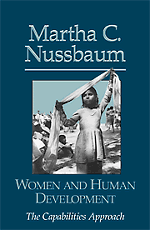Preface
Published online by Cambridge University Press: 05 June 2012
Summary
This study of human capabilities as the basis for fundamental political principles focuses on the lives of women in developing countries. That is obviously only one area where this approach might be used to think about political principles; my discussion will allude to some of its other implications. Even within the study of women, this account deals with only some of the issues that might be addressed in a more exhaustive treatment of the capabilities approach. Thus religion and the family receive detailed treatment, while other equally important topics, such as property rights and education, do not.
In another way as well the present account is narrow: it presents the capabilities approach for a broad interdisciplinary audience, with a view to shaping public policy. Because my version of this approach is philosophical and would offer nothing if stripped of its philosophical arguments, those arguments are here, but sometimes in a brief and compressed form. Many philosophical issues that deserve detailed analysis – in particular, issues of justification, realism, and objectivity – are only sketched (although I have given some of them more detailed treatment in articles cited in the notes).
Finally, I discuss only my own version of the capabilities approach. I do not spend time on its historical antecedents in Aristotle and Marx, or on relatives such as Mill's Aristotelian view of human flourishing, the writings of the Yugoslav humanist Marxists, and various forms of modern Thomism.
- Type
- Chapter
- Information
- Women and Human DevelopmentThe Capabilities Approach, pp. xiii - xivPublisher: Cambridge University PressPrint publication year: 2000
- 1
- Cited by

